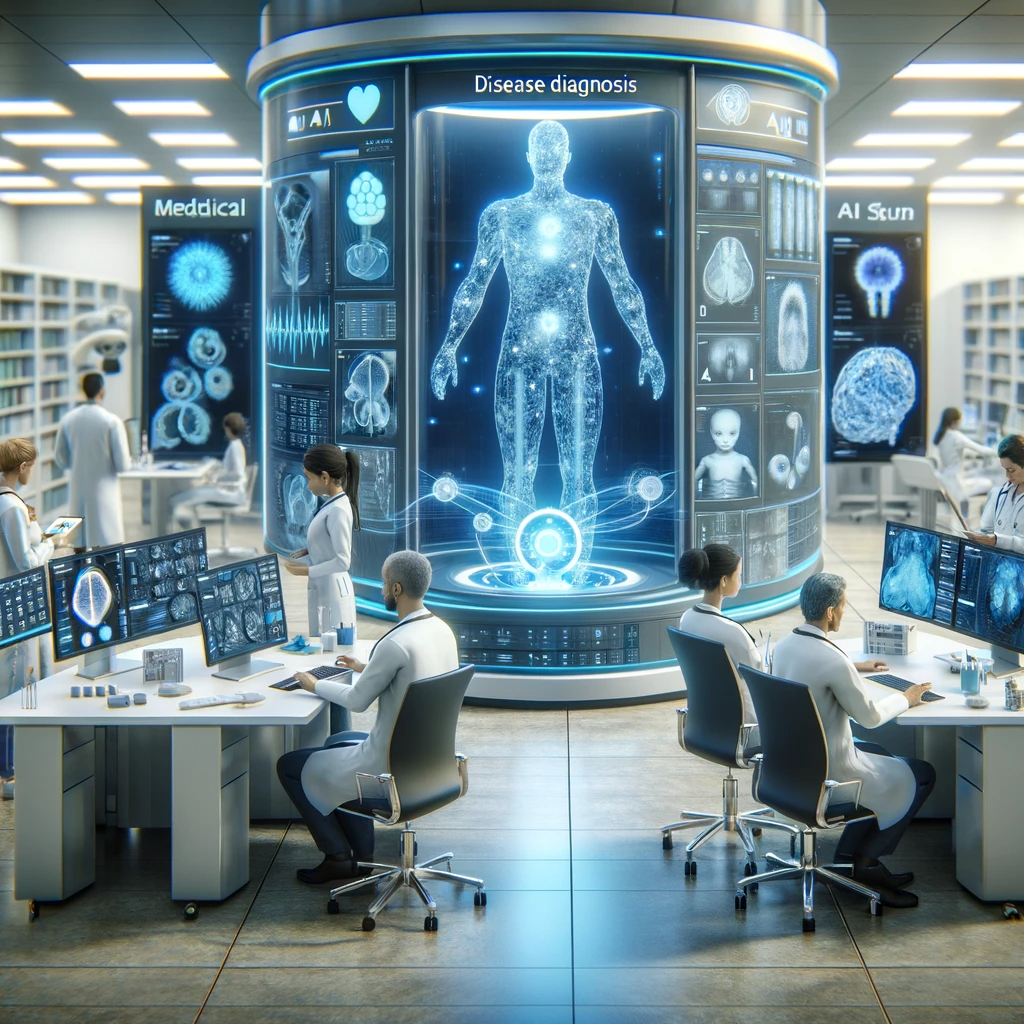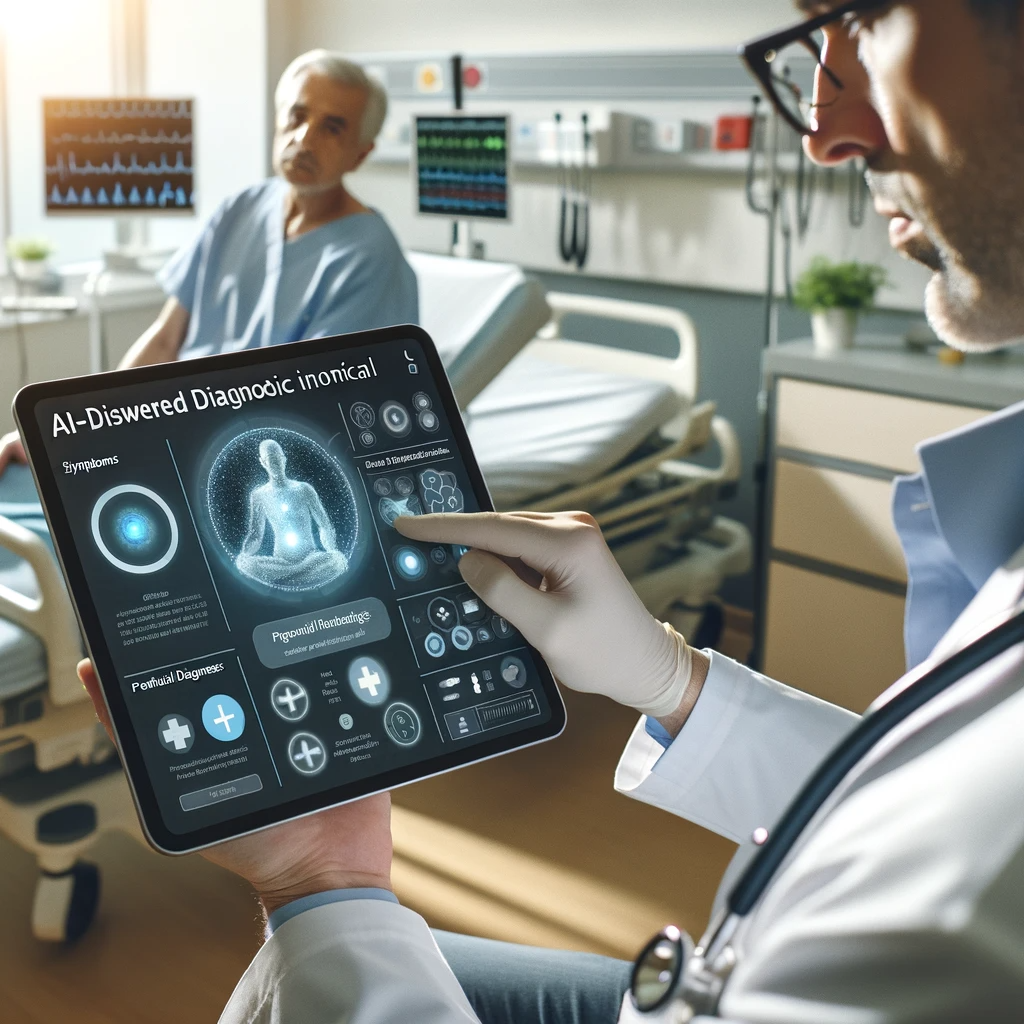In an era marked by remarkable advancements in technology, artificial intelligence (AI) has emerged as a transformative force across various industries. Nowhere is its potential more tantalizing than in the field of healthcare, where the accuracy and speed of medical diagnoses can mean the difference between life and death. The question on many minds is whether AI, with its computational prowess and data-driven insights, can surpass the diagnostic acumen of human doctors. Can algorithms and machine learning outperform years of medical training, clinical experience, and intuition? This article embarks on a journey to explore the capabilities and limitations of AI in medical diagnostics, delving into the ever-evolving realm of healthcare where silicon minds intersect with human expertise. Join us as we navigate this intriguing landscape, aiming to understand if AI can indeed diagnose diseases more accurately than the seasoned hands and sharp minds of healthcare professionals.
The Rise of AI in Healthcare
1.1. Historical Context
Over the past few decades, AI has undergone a remarkable transformation from a theoretical concept to a practical tool with profound implications for healthcare. While the roots of AI in medicine can be traced back to the 1960s, it’s in recent years that AI has gained substantial traction. The confluence of abundant medical data, powerful computing resources, and breakthroughs in machine learning and deep learning algorithms has paved the way for AI’s ascent in healthcare. Today, AI is not just a buzzword; it’s a technological force that promises to redefine how diseases are diagnosed and treated.
1.2. The Promise of AI in Diagnostics
The allure of AI in medical diagnostics lies in its potential to enhance healthcare in multiple ways. First and foremost is the promise of improved accuracy. AI algorithms can analyze vast datasets with unparalleled precision, detecting patterns and anomalies that might elude even the keenest human eye. This increased accuracy can lead to earlier disease detection and more effective treatment strategies. Moreover, AI-driven diagnostics can significantly reduce the time required for analysis. What might take hours or days for a human doctor to assess can be done by AI in mere minutes. This speed is especially critical in emergency situations where rapid diagnosis can be a matter of life or death. Additionally, AI has the potential to democratize healthcare by extending its reach to underserved and remote populations, where access to expert medical professionals is limited.

How AI Diagnostics Work
Machine Learning and Deep Learning
At the heart of AI diagnostics are machine learning and deep learning algorithms. These algorithms allow AI systems to learn from data, recognize patterns, and make predictions. In the context of medical diagnostics, machine learning algorithms can be trained to identify correlations between various patient data points and specific medical conditions. Deep learning, a subset of machine learning, excels at processing complex and unstructured data, such as medical images and electronic health records.
Data Collection and Training
To develop effective AI diagnostic models, a vast amount of data is required. Medical data encompassing patient records, lab results, medical images, and clinical notes serve as the foundation for training these models. The process involves feeding the AI system with large datasets, allowing it to learn and refine its diagnostic capabilities over time. The quality and diversity of the data are critical factors that influence the performance of AI diagnostics. Training data should be representative of the population it aims to serve to ensure accurate and unbiased results.
AI vs. Human Doctors – The Face-off
Accuracy and Speed
In recent years, AI has demonstrated its potential to surpass human doctors in specific diagnostic tasks. For instance, AI algorithms have excelled in detecting certain types of cancer from medical images with higher accuracy rates than human radiologists. Additionally, AI-driven diagnostic tools have proven valuable in identifying rare diseases or conditions that might be overlooked in a clinical setting. The speed at which AI can process and analyze data is also a game-changer, particularly in urgent cases where timely diagnosis is essential.
Limitations of AI
While the capabilities of AI are undeniably impressive, it’s crucial to acknowledge its limitations. AI systems are only as good as the data they are trained on, and biases in training data can lead to skewed results. Furthermore, AI lacks the ability to consider the holistic patient experience, including psychological and emotional aspects, which are often essential in diagnosis. Additionally, AI may struggle with extremely rare or novel conditions that haven’t been encountered in the training data. Over-reliance on AI without human oversight can be risky, as the technology is not infallible and errors can occur. As such, it’s vital to strike a balance between AI and human expertise in medical diagnostics.
In the next sections, we will delve deeper into collaborative approaches, ethical and legal considerations, and the future of AI in medical diagnostics, providing a comprehensive exploration of this complex and evolving field.
Collaborative Approaches
Augmented Intelligence
Recognizing the strengths and limitations of both AI and human doctors, a growing trend in healthcare is the concept of augmented intelligence. This approach emphasizes the collaboration between AI systems and medical professionals. Instead of pitting AI against doctors, it leverages AI as a tool to enhance their capabilities. AI can assist in data analysis, offer suggestions based on vast medical knowledge, and help prioritize cases, allowing doctors to make more informed decisions. Augmented intelligence can lead to a synergy where the combined expertise of humans and machines results in superior diagnostic outcomes.
Telemedicine and Remote Diagnosis
The advent of telemedicine and remote diagnosis has been accelerated by AI. Patients can now receive medical consultations and diagnostic assessments without physically visiting a healthcare facility. AI-powered chatbots and virtual assistants help gather patient information, while AI algorithms aid in remote monitoring and diagnosis. This transformation has the potential to improve healthcare accessibility, especially for individuals in rural or underserved areas. However, it also raises questions about the reliability of remote diagnostics and the need for robust data security measures.
Section 5: Ethical and Legal Considerations
Patient Data Privacy
The use of AI in medical diagnostics raises significant concerns about patient data privacy. Healthcare data is highly sensitive, and maintaining its confidentiality is paramount. The article will delve into the ethical and legal considerations surrounding the collection, storage, and sharing of patient data in AI-driven diagnostics. It will also touch on regulations such as HIPAA (Health Insurance Portability and Accountability Act) and GDPR (General Data Protection Regulation) that govern data protection in healthcare.
Liability and Accountability
In cases of diagnostic errors or adverse outcomes involving AI, questions of liability and accountability come to the forefront. Who is responsible when an AI system provides an incorrect diagnosis? The article will explore the legal and ethical dimensions of AI-related liabilities and discuss potential frameworks for addressing these issues. It will also examine the importance of human oversight and the role of healthcare providers in ensuring the accuracy of AI-assisted diagnoses.
The Future of AI in Medical Diagnostics
Ongoing Research and Development
AI’s journey in medical diagnostics is far from over. Ongoing research and development efforts continue to refine AI algorithms, improve data quality, and expand the range of medical conditions that can be diagnosed accurately. This section will explore current trends and cutting-edge developments in AI diagnostics, providing insights into what the future may hold.
Patient Acceptance and Trust
One critical aspect of AI’s future in healthcare is patient acceptance and trust. The article will discuss the importance of building trust in AI-assisted diagnostics, addressing concerns about algorithmic bias, transparency, and the need for clear communication between healthcare providers and patients. Trust plays a pivotal role in the successful integration of AI into healthcare systems.

Conclusion
In conclusion, the intersection of AI and medical diagnostics presents a fascinating and evolving landscape. AI holds immense promise in improving diagnostic accuracy, speed, and accessibility. However, it is not without its challenges and limitations. Striking the right balance between AI and human expertise, ensuring data privacy, and addressing ethical and legal considerations are essential for harnessing the full potential of AI in healthcare. The question of whether AI can diagnose diseases more accurately than doctors may not have a straightforward answer, as the future likely holds a collaborative synergy between human intelligence and artificial intelligence in the realm of medical diagnostics.
As we move forward, the healthcare industry must navigate these complexities thoughtfully, always keeping patient well-being at the forefront. The journey to fully realizing the potential of AI in medical diagnostics is a dynamic one, with each step forward bringing us closer to a future where healthcare is more precise, efficient, and accessible to all.
